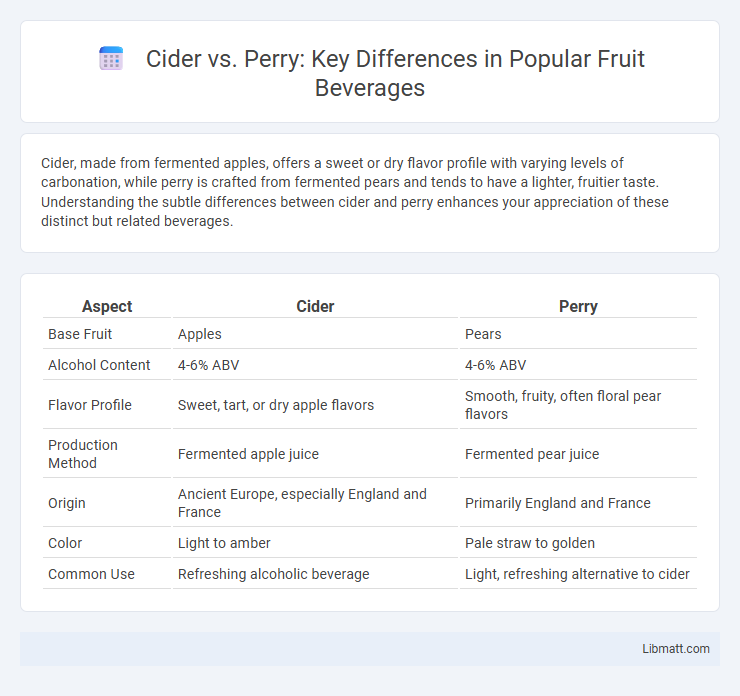Cider, made from fermented apples, offers a sweet or dry flavor profile with varying levels of carbonation, while perry is crafted from fermented pears and tends to have a lighter, fruitier taste. Understanding the subtle differences between cider and perry enhances your appreciation of these distinct but related beverages.
Table of Comparison
| Aspect | Cider | Perry |
|---|---|---|
| Base Fruit | Apples | Pears |
| Alcohol Content | 4-6% ABV | 4-6% ABV |
| Flavor Profile | Sweet, tart, or dry apple flavors | Smooth, fruity, often floral pear flavors |
| Production Method | Fermented apple juice | Fermented pear juice |
| Origin | Ancient Europe, especially England and France | Primarily England and France |
| Color | Light to amber | Pale straw to golden |
| Common Use | Refreshing alcoholic beverage | Light, refreshing alternative to cider |
Introduction to Cider and Perry
Cider is an alcoholic beverage made primarily from fermented apple juice, while perry is similarly produced from fermented pear juice, specifically from varieties known as perry pears. Both drinks share a fermentation process but differ in fruit base, flavor profiles, and regional production traditions. Perry often has a lighter, more delicate taste compared to the typically tangier and more robust flavor of apple cider.
Historical Origins and Traditions
Cider and perry have distinct historical origins rooted in their respective fruit bases; cider has been produced from apples since ancient times across Europe, especially in regions like Normandy and the West Country of England, while perry is made from specific varieties of pears traditionally grown in areas such as Herefordshire and Gloucestershire. Both beverages carry rich cultural traditions, with cider historically associated with rural farming communities and seasonal harvest celebrations, whereas perry has a more niche heritage tied to specific pear orchards and often enjoyed at English country fairs. Understanding these origins helps you appreciate the unique craftsmanship and regional identity embedded in each drink.
Key Ingredients: Apples vs. Pears
Cider is primarily made from fermented apples, providing a crisp and refreshing taste rich in apple-derived sugars and tannins, while perry is crafted from specific varieties of pears, offering a smoother, often sweeter flavor profile with distinct pear aromas. The key ingredients in cider consist of apple juice, which includes various apple cultivars contributing to its acidity and complexity, whereas perry utilizes juice from perry pears, known for their higher sugar content and unique pear characteristics. Understanding the difference in fruit bases helps you appreciate the distinct sensory experiences and production methods behind these two traditional beverages.
Production Processes Compared
Cider is produced by fermenting the juice of apples, while perry is made from the fermentation of pears, with both using natural yeast for conversion of sugars to alcohol. The production process for cider often involves crushing and pressing apples, followed by fermentation, whereas perry requires careful selection of specific pear varieties known for their acidity and tannin content, with pears typically being pressed more gently to avoid bitterness. Understanding these production differences helps you appreciate the distinct flavor profiles and textures inherent to each beverage.
Flavor Profiles and Aromas
Cider offers a wide range of flavor profiles, typically featuring crisp, refreshing apple notes with varying levels of sweetness, acidity, and tannins depending on the apple varieties used. Perry, made from specific pear cultivars, presents a distinct aromatic profile characterized by floral, honeyed, and subtly spicy notes, often lighter and more delicate than cider. The flavor complexity of perry tends to be smoother and less tart than cider, emphasizing fruity pear nuances and a soft mouthfeel.
Health Benefits and Nutritional Value
Cider, made from fermented apples, generally contains antioxidants like vitamin C and polyphenols that support heart health and reduce inflammation. Perry, produced from fermented pears, offers similar nutritional benefits but tends to have slightly higher levels of natural sugars and fewer tannins compared to apple cider. Your choice between cider and perry can influence calorie intake and antioxidant consumption, making it important to consider their specific nutrient profiles when aiming for health benefits.
Regional Variations Worldwide
Cider and perry exhibit distinct regional variations that reflect local fruit varieties and production traditions worldwide. In the UK and parts of Europe, cider is primarily crafted from apples, while perry is made exclusively from specific pear varieties, often linked to regions like Gloucestershire and Herefordshire. Your experience of these beverages can vary significantly depending on the terroir and cultural heritage influencing their flavor profiles and production techniques.
Food Pairings and Serving Suggestions
Cider pairs exceptionally well with hearty dishes such as pork, cheddar cheese, and apple-focused desserts, while perry complements lighter fare like goat cheese, seafood, and salads due to its subtle pear flavors. Serving cider chilled enhances its refreshing qualities, ideal for casual gatherings, whereas perry is best served slightly chilled to highlight its delicate, aromatic profile. Your choice between cider and perry can elevate a meal by matching the drink's sweetness and acidity to the food's flavor intensity.
Cider and Perry Market Trends
Cider and perry markets have experienced significant growth, driven by increased consumer demand for craft and artisanal beverages. The global cider market is projected to reach USD 5.3 billion by 2027, fueled by innovation in flavors and premium product offerings. Perry, a pear-based alternative, is gaining traction among niche consumers seeking unique tastes, contributing to a steady rise in its market share alongside traditional cider products.
Which to Choose: Cider or Perry?
Choosing between cider and perry depends on your taste preferences and the fruit base you prefer, as cider is made from apples while perry is crafted from pears. Cider tends to offer a wide range of flavors from sweet to dry, often with a crisp, refreshing finish, whereas perry typically delivers a lighter, slightly floral taste profile. Understanding these distinctive characteristics can help you select the perfect beverage to suit your palate and occasion.
Cider vs perry Infographic

 libmatt.com
libmatt.com